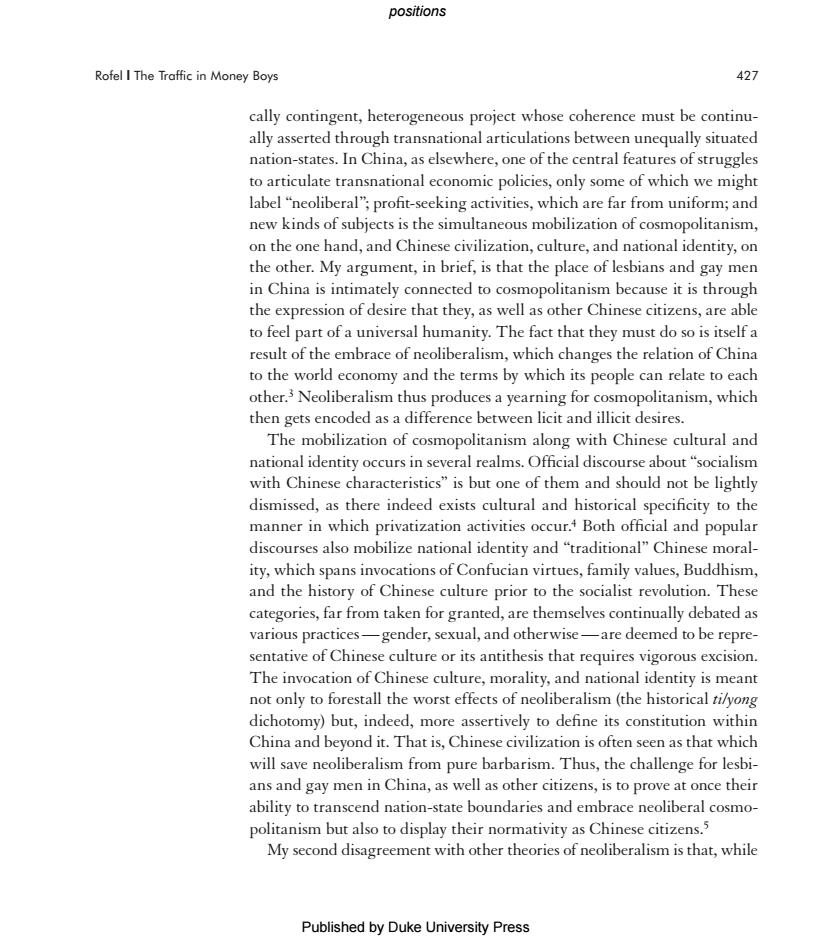正在加载图片...

positions Rofel I The Traffic in Money Boys 427 cally contingent,heterogeneous project whose coherence must be continu- ally asserted through transnational articulations between unequally situated nation-states.In China,as elsewhere,one of the central features of struggles to articulate transnational economic policies,only some of which we might label "neoliberal";profit-seeking activities,which are far from uniform;and new kinds of subjects is the simultaneous mobilization of cosmopolitanism, on the one hand,and Chinese civilization,culture,and national identity,on the other.My argument,in brief,is that the place of lesbians and gay men in China is intimately connected to cosmopolitanism because it is through the expression of desire that they,as well as other Chinese citizens,are able to feel part of a universal humanity.The fact that they must do so is itself a result of the embrace of neoliberalism,which changes the relation of China to the world economy and the terms by which its people can relate to each other.3 Neoliberalism thus produces a yearning for cosmopolitanism,which then gets encoded as a difference between licit and illicit desires. The mobilization of cosmopolitanism along with Chinese cultural and national identity occurs in several realms.Official discourse about"socialism with Chinese characteristics"is but one of them and should not be lightly dismissed,as there indeed exists cultural and historical specificity to the manner in which privatization activities occur.Both official and popular discourses also mobilize national identity and"traditional"Chinese moral- ity,which spans invocations of Confucian virtues,family values,Buddhism, and the history of Chinese culture prior to the socialist revolution.These categories,far from taken for granted,are themselves continually debated as various practices-gender,sexual,and otherwise-are deemed to be repre- sentative of Chinese culture or its antithesis that requires vigorous excision. The invocation of Chinese culture,morality,and national identity is meant not only to forestall the worst effects of neoliberalism (the historical ti/lyong dichotomy)but,indeed,more assertively to define its constitution within China and beyond it.That is,Chinese civilization is often seen as that which will save neoliberalism from pure barbarism.Thus,the challenge for lesbi- ans and gay men in China,as well as other citizens,is to prove at once their ability to transcend nation-state boundaries and embrace neoliberal cosmo- politanism but also to display their normativity as Chinese citizens.5 My second disagreement with other theories of neoliberalism is that,while Published by Duke University PressRofel ❘ The Traffic in Money Boys 427 cally contingent, heterogeneous project whose coherence must be continually asserted through transnational articulations between unequally situated nation-states. In China, as elsewhere, one of the central features of struggles to articulate transnational economic policies, only some of which we might label “neoliberal”; profit-seeking activities, which are far from uniform; and new kinds of subjects is the simultaneous mobilization of cosmopolitanism, on the one hand, and Chinese civilization, culture, and national identity, on the other. My argument, in brief, is that the place of lesbians and gay men in China is intimately connected to cosmopolitanism because it is through the expression of desire that they, as well as other Chinese citizens, are able to feel part of a universal humanity. The fact that they must do so is itself a result of the embrace of neoliberalism, which changes the relation of China to the world economy and the terms by which its people can relate to each other.3 Neoliberalism thus produces a yearning for cosmopolitanism, which then gets encoded as a difference between licit and illicit desires. The mobilization of cosmopolitanism along with Chinese cultural and national identity occurs in several realms. Official discourse about “socialism with Chinese characteristics” is but one of them and should not be lightly dismissed, as there indeed exists cultural and historical specificity to the manner in which privatization activities occur.4 Both official and popular discourses also mobilize national identity and “traditional” Chinese morality, which spans invocations of Confucian virtues, family values, Buddhism, and the history of Chinese culture prior to the socialist revolution. These categories, far from taken for granted, are themselves continually debated as various practices— gender, sexual, and otherwise— are deemed to be representative of Chinese culture or its antithesis that requires vigorous excision. The invocation of Chinese culture, morality, and national identity is meant not only to forestall the worst effects of neoliberalism (the historical ti/yong dichotomy) but, indeed, more assertively to define its constitution within China and beyond it. That is, Chinese civilization is often seen as that which will save neoliberalism from pure barbarism. Thus, the challenge for lesbians and gay men in China, as well as other citizens, is to prove at once their ability to transcend nation-state boundaries and embrace neoliberal cosmopolitanism but also to display their normativity as Chinese citizens.5 My second disagreement with other theories of neoliberalism is that, while positions Published by Duke University Press